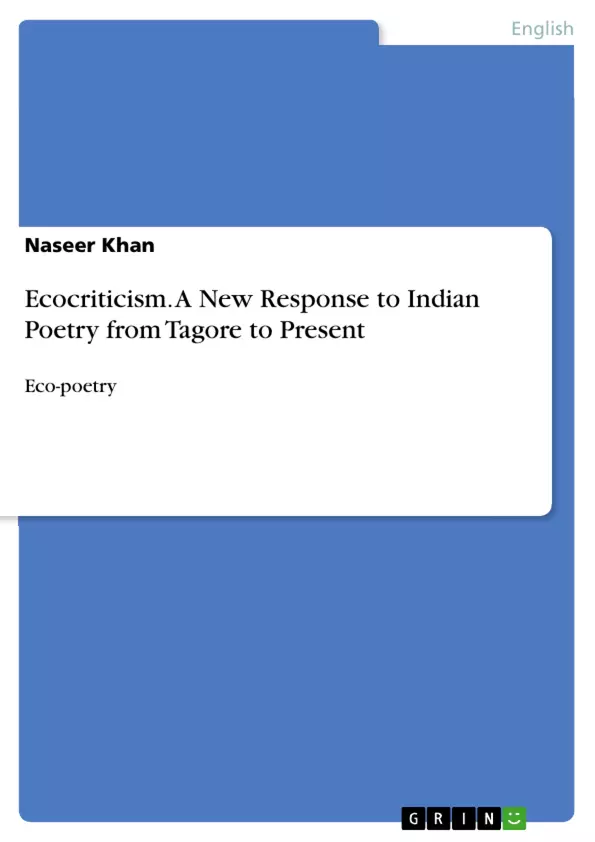Eco-poetry is an emerging field of this postmodern world. We find that the poetry was taken as a piece of romantic enjoyment but the recent trends in research have changed its place in the literary canon and the new Eco-poetic genre is being created to make an academic atmosphere for the safeguard of the environment. In 1962 William Carson in his study Silent Spring wrote that the pesticides that American's use has a negative effect on the species as well as on human body. Carson's argument gave world a new eco consciousness and they made efforts to preserve the ecosystem. Human beings were in great slumber and they were not knowing which color there is of and it was with the maiden discovery of Apollo 11 which not only made its maiden landing on the moon but it kept human consciousness in zeal when it took the photographs of the earth and these photographs made us realize that the globe we are living in is green and has a variety of life and rest are lifeless objects.
Worldwide conferences are being held to have an environmental consciousness and millions of dollars are being spent in this or that way to bring the planet in its original shape but unfortunately we say a lot and do less. Therefore to give safeguard to this globe it is our prime duty to make ECO FRONTS from all sides including academic one so that globe could sustain its greenery in balance, as we know that this globe is full of colors and the poets have sung about these colorful aspects not to romanticize the things but to give an ecological consciousness. The present study is an eco-poetic dialogue based on Indian poetry from Tagore to present and this study has tried to highlight how poetry could be helpful to save the world and its colorful species from extinction. Thus the eco-poetic study has tried to reveal many truths about Indian ecology as how Indian poets whether here or in Diaspora see the present Indian ecology. India a growing economy on all fronts is going through a huge developmental changes.
The Word Ecocriticism though belongs to white race but has similar apprehension for the entire globe and the word was used by William Rueckert in Literature and Ecology: An Experiment in Ecocriticism in 1978 to highlight the ecological problems depicted through literature. Thus present study has tried to highlight some of the ecological problems which India is facing at present and to show all these problems effort has been made to show an eco-historical perspective.
Table of Contents
- Introduction
- Ecocriticism: A New Response to Indian Poetry
- Tagore: A Pioneer of Ecopoetics
- The Legacy of Nature in Post-Independence Indian Poetry
- Contemporary Indian Ecopoetry
- Conclusion
Objectives and Key Themes
This study aims to examine the role of ecocriticism in Indian poetry, exploring how poets have responded to environmental issues and celebrated the natural world. The study focuses on the evolution of ecopoetics in India, from Rabindranath Tagore to contemporary writers. Key themes explored include:- The relationship between literature and the environment
- The impact of industrialization and modernization on the natural world
- The importance of ecological consciousness and sustainable practices
- The role of poetry in raising awareness about environmental issues
- The celebration and mourning of natural species in Indian poetry
Chapter Summaries
- The Introduction provides an overview of the study and its objectives, emphasizing the urgent need for environmental consciousness and the role of poetry in addressing ecological issues.
- The chapter on ecocriticism explores the development of this field, highlighting its significance in interpreting literary texts through an environmental lens.
- The chapter on Tagore examines his poetry and his pioneering contributions to ecopoetics in India.
- The chapter on post-independence Indian poetry analyzes how poets have responded to the changing environment and the impact of development on the natural world.
- The chapter on contemporary Indian ecopoetry explores the works of contemporary writers who are engaging with environmental concerns and promoting ecological consciousness.
Keywords
This study delves into the intersection of ecocriticism, Indian poetry, and the environment. It examines the evolution of ecopoetics in India, emphasizing the significance of ecological consciousness, environmental ethics, and sustainable practices. Key concepts explored include natural species, industrialization, modernization, and the role of poetry in raising awareness about ecological issues.- Quote paper
- Naseer Khan (Author), 2014, Ecocriticism. A New Response to Indian Poetry from Tagore to Present, Munich, GRIN Verlag, https://www.hausarbeiten.de/document/283816


